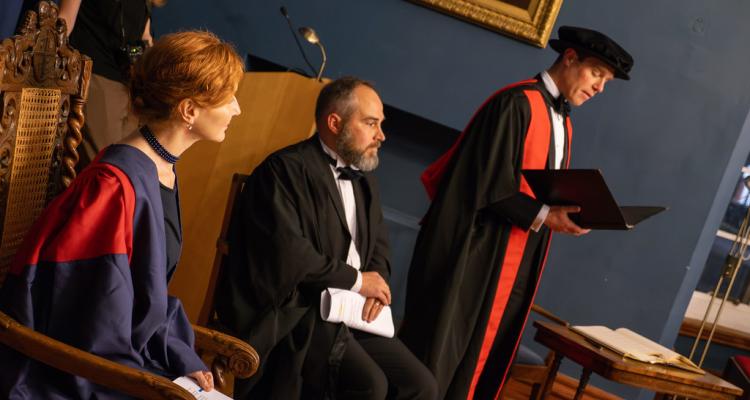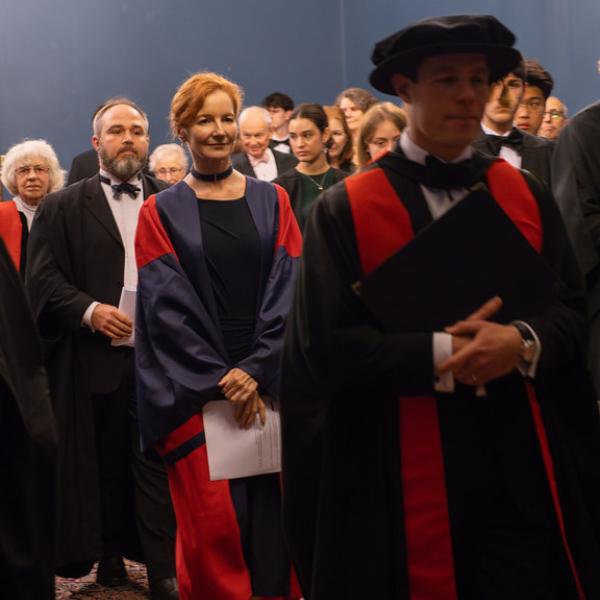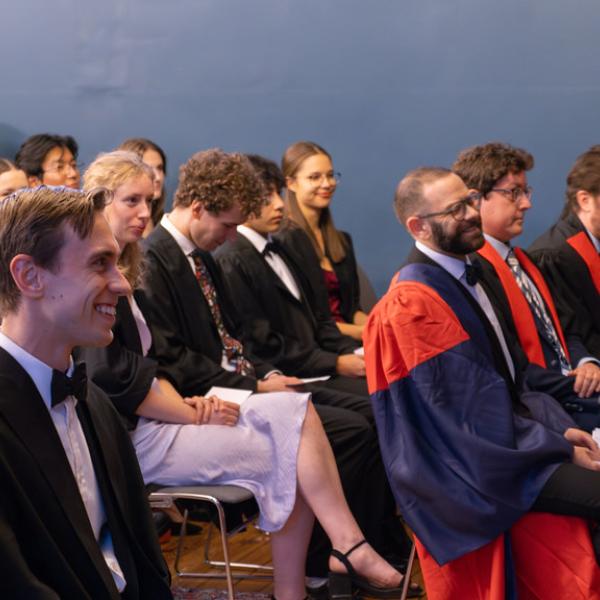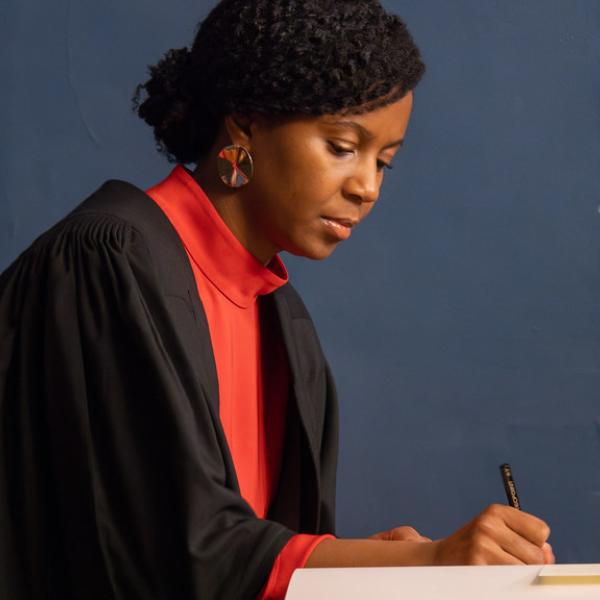College News
New Fellows formally admitted to Girton College in Ceremony of Admission

Magdalena Douleva brings more than 20 years of experience as a leader and senior fundraiser to the role, having shaped and delivered major fundraising campaigns, more than doubled previous level of giving, and secured transformational gifts, often the largest in their respective institutions’ history.
Magdalena has worked with a diverse range of organisations across the higher education and non-profit sectors, including University College Dublin, the RAND Corporation, Nottingham Trent University, Rotterdam School of Management, Hult International Business School, the American University in Cairo, the International Union for Conservation of Nature, Christian Aid, and Voluntary Service Overseas.
Magdalena has also served as Vice President with CCS Fundraising, a global strategic fundraising firm, on the boards of the Royal Central School of Speech and Drama and the English Speaking Union, and as a volunteer for CASE Europe and Chapel & York, promoting international best practice in educational advancement and cross-border fundraising.
Bryn's research focuses on the optimal design of resilient, climate-neutral energy systems, and the critical trade-offs necessary to transform how we meet our energy demands. His work spans spatial scales, from urban heat networks to the complete energy flows of entire continents. Bryn frequently crosses disciplines, to consider future energy infrastructure in the context of the wider systems in which we live. He works closely with meteorologists, climate scientists, transport planners, industrial ecologists, and social scientists across Europe. Alongside my research, Bryn develops and maintains open-source software to support the decision-making process. Bryn is an advocate for good software practices and open, reproducible science following the FAIR principles.
Clarck is a cataloguer of medieval manuscripts in the Wellcome-funded project Curious Cures in Cambridge Libraries and Medieval Manuscripts Specialist (0.3 FTE) at Cambridge University Library's Special Collections.
Before joining Cambridge University Library, Clarck worked as a cataloguer and researcher of manuscripts at the British Library. He obtained a PhD from the Insitute for Medieval Studies at the University of Leeds with a dissertation on the transmission of visionary writings between English and Continental female religious communities in the Late Middle Ages.
Clarck was co-editor of the Newsletter of the Association for Manuscripts and Archives in Research Collections (AMARC) between 2019 and 2023.
Freya's research explores how proletarian dance as a cultural form both emerged from and reinforced the visual culture of labor in Depression-era USA. Central to her work is the expanded notion of dance venues during the 1930s. She argues that dance was not confined to the stage as live performance but instead circulated widely—through the pages of magazines like New Theatre and New Masses, newspapers such as The New York Times and Dance Observer, exhibitions and film screenings by the Film and Photo League, and productions by the Theatre Union. By highlighting the inextricable connection between dance and media throughout the 1930s, Freya challenges the conventional view of dance as distinct from photography and film, rethinking it through the lenses of reproduction and circulation. In bringing this often-overlooked interpretive and descriptive register for dance to light, she aims to dispel the reliance on presence and authenticity in dance scholarship, instead framing proletarian dance as a dynamic field for action and intervention.
Henry is an evolutionary geneticist specializing in rapid, anthropogenic evolution, with a focus on agricultural pests and invasive species that pose critical risks to food security and biodiversity worldwide. His research highlights how these threats are intensified by the evolution of pesticide resistance. During his PhD with the Insect Evolution and Genomics Group at the University of Cambridge, Henry investigated the invasive noctuid caterpillar Helicoverpa armigera in Brazil. He discovered that H. armigera hybridized with the native pest species Helicoverpa zea, resulting in the bi-directional exchange of resistance alleles between the two species despite the persistence of distinct species boundaries where they coexist. His research demonstrated that the exchange of pre-adapted genetic variants enabled rapid adaptation in both species. Additionally, through genomic monitoring, he traced the spread of a resistance gene from H. armigera into the North American population of H. zea.
Anthony Bale researches later medieval English literature and culture. His early work explored Christian-Jewish relations, popular religion, and the history of antisemitism, which he followed with studies on the poetry of John Lydgate, the cult of St. Edmund of East Anglia, and medieval histories of emotion. His research then expanded into pilgrimage studies, the history of Jerusalem and the Holy Land, and the editing and translating of The Book of Marvels and Travels (Oxford UP, 2012) by John Mandeville and The Book of Margery Kempe (Oxford UP, 2016).
Anthony's research has been supported by grants from the British Academy, the Leverhulme Trust, and the Arts and Humanities Research Council, among others. He has held visiting scholarships at the Huntington Library in California and has been awarded prestigious fellowships, including the Frankel Fellowship at the University of Michigan at Ann Arbor, the Distinguished International Fellowship in the History of Emotions at the University of Melbourne, the Bloomfield Fellowship at Harvard University, the Brittingham Fellowship at the University of Wisconsin at Madison, and a fellowship at the National Humanities Center in North Carolina.
Adam's research interests centre upon rhyme, rhythm, aesthetic experience, the relationship between poetry and song, and that between lyric and narrative. The outlet for these interests is often creative: Adam is the author of the poetry collections Several Deer (Carcanet, 2016) and The Culture of My Stuff (Carcanet, 2020) and collaborated with Dr Carol Adlam and Dr James Wade on Girton Time (Beam Editions, 2023).
Kamilah studied Medical Anthropology (BSc) and Research Methods in Social Anthropology (MRes) at Durham University. She then undertook ethnographic research at the University of Manchester (PhD), to explore the challenges undergraduate students encounter in making the transition to Advanced Mathematical Thinking in pure mathematics.
She has worked as an academic developer at various universities on institutional initiatives and strategies to support student learning and facilitate institutional change. She currently works at Cambridge Centre for Teaching and Learning as a Senior Teaching Associate, undertaking research to explore and address differential student outcomes across the collegiate University and is the Course Director for the Cambridge Teaching & Learning Recognition Scheme, which supports colleagues at Cambridge to gain Fellowship to the Higher Education Academy.
Maggie's primary research centres on late courtship and engagement among the middle class in nineteenth-century England. Her work focuses on uncovering the experience of engagement for individuals, including the cultural capital awarded to them, the interactions between fiancés and their communities, shifts in identities, and the representation of engagement within broader nineteenth-century culture. Her methodology emphasizes material culture, history of emotions, and sensory history frameworks.
She is currently the Researcher for Girton College's Legacies of Enslavement Committee.
Antoinette is an academic lawyer with a background in Community Economic Development Law and Policy, Public Interest Law and Climate Change Law. She holds a PhD from Trinity College Dublin specialising in public interest law, access to justice and community economic development, an LLM from University of California Los Angeles (UCLA David J Epstein Programme in Public Interest Law & Policy), and Bachelor of Civil Law (BCL) from University College Dublin. She is also a trained legal interpreter and translator (Spanish/English) and has a diploma in journalism.
She is a Centre Fellow at the Cambridge Centre for Property Law (CCPL), Associate Fellow at the Centre for International Sustainable Development Law (CISDL), Secretariat member at the Climate Law and Governance Initiative (CLGI), member of IUCN-WCEL (World Commission on Environmental Law), Fellow of the Royal Society of the Arts and Associate Fellow of the Higher Education Academy (AFHEA). She is the Director of Studies in Land Economy at Girton College and Faculty Advisor for the Cambridge Pro-Bono Project (CPP).
Ruchit is a researcher, architect, urban designer, and development practitioner. Ruchit has previously worked on projects ranging from community led regeneration, community led heritage, and community led design.
Areas of interest include critical analysis of the current understandings of Heritage, participatory decision-making, tools for participation such as codesign and coproduction, transdisciplinary research in built environment, and urban commons.
Ruchit graduated with a PhD in Design Research Planning from the Kingston University London, a Masters degree from the University College London in Development Planning: Building and Urban Design in Development, and a Bachelor of Architecture degree from the University of Mumbai.
Matt is the public astronomer at the University of Cambridge's Institute of Astronomy (IoA) and an astrophysicist by training. He oversees public engagement activities at the IoA, including running the schools outreach program, winter stargazing evenings, Cambridge Festival events, and more. He also supports IoA researchers who aim to engage the public with their research.
He is an experienced science communicator and writer. He gives public lectures at venues including the Royal Institution, New Scientist, the Royal Astronomical Society, and the British Astronomical Association, and his science writing has appeared in New Scientist, The Daily Beast, Aeon magazine, The Guardian, Writer's Digest, and other outlets.
He also writes popular astronomy books for adults and children. He is the author of Astrophysics for Supervillains (2024, DK) and The Invisible Universe: Why There’s More to Reality than Meets the Eye (2021, Oneworld).
Akeelah Bertram is a cross-disciplinary artist who lives and works in Leeds. She has exhibited nationally and internationally since studying at the University of Leeds, Hochschule für Bildende Künste, (Dresden) and the Royal College of Art (London).
Bertram is interested in collective narratives, challenging perspectives and innovating modes of communication. She produces work across new media art, interaction design, sculpture and performance exploring heritage and identity through creative technology, and is currently the Gatenby Fellow in Contemporary Art, University of Leeds.
Moosa is the editor of Atheer, an electronic newspaper established in 2013, he leads one of the Sultanate’s most prominent platforms focused on local and cultural affairs. Each month, Atheer publishes a cultural piece in collaboration with the Oman Establishment for Press, Publishing, and Advertising. His career began as an information systems analyst, and he holds a Master’s degree in Information Systems. Notably, he was the first person to establish academic virtual content for distance learning in Oman in a programme accredited by the Ministry of Higher Education. He also played a foundational role in establishing Sablat Oman, a forum addressing key Omani issues, and served as the Chairman of its Board of Directors from 2006 to 2013.
History of the Ceremony of Admission
During the first 55 years of its history, Girton College had Lecturers and Directors of Studies, but no Fellows except for the Eugenie Strong Research Fellowship, established in 1910. There was therefore no admission ceremony in the early years of the College.
Girton’s first Charter and Statutes, granted 100 years ago in 1924, placed control of the College in the hands of the Mistress, Fellows and three members of the University Senate; 1924 was therefore the first year that Girton had Fellows. A “Ceremony of Admissions” of Fellows and Scholars was established in 1928 in a form similar to the present version. The Fellows’ Register, the same register that is signed on the evening, was instituted in 1954 when the Revised Charter and Statutes of the College came into force.




